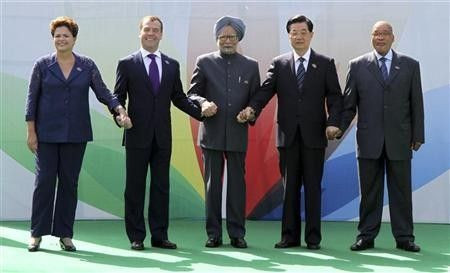Emerging Markets Lose Their Sparkle, IMF Says

Hopes that emerging markets will lead the world out of the global economic slowdown are beginning to dim.
Christine Lagarde, managing director of the International Monetary Fund (IMF), voiced her concerns over the strength of the global economy, emphasizing that emerging markets, which currently account for two-thirds of global growth, were showing signs of weakening.
In the last few months, the global outlook has been more worrying for Europe, the United States and large emerging markets, Lagarde said at a press conference in Tokyo on Friday. She added that economic data from major and emerging economies had deteriorated in recent months.
In its April report, the IMF revised its global growth forecast for this year upward to 3.5 percent from 3.3 percent in January. It also revised its 2013 forecast to 4.1 percent from its previous estimate of 3.9 percent. However, the IMF will now be reducing its global growth forecasts in a report which will be released on July 16.
A slide in BRIC activity
The HSBC Emerging Markets Index (EMI), a key economic indicator for emerging markets worldwide, slid from 55 to 54.2 in the second quarter, plummeting to its lowest level in two years. These readings, which were released on Thursday, are currently below the index's long-run series average of 54.8. The EMI, which roped in data from 16 purchasing managers' indexes (PMIs), nosedived on a decline in manufacturing activity across Brazil, Russia, India and China because of dwindling export orders from Europe, a key trading bloc for the BRIC nations.
As European demand for BRIC exports falls, inventories have been building up in emerging markets, leading to significant losses in the balance sheets of various businesses in these countries -- an incentive for businesses to drop their production dramatically.
As the ricocheting effects of the political and economic turmoil in Europe bleed into Asia, risks of inflation and overheating -- operating at or near capacity -- have grown rampant in countries like China and India.
Latin America hasn't been spared the pinpricks from Europe either. Jaded by falling export orders from Europe, Latin American regions are now eyeing investment and trade opportunities in South East Asian countries like Indonesia.
Draconian measures to curtail inflation in countries like Brazil, China and India have further affected national output in all three countries. Quantitative tightening -- reducing the supply of money by imposing credit controls and higher interest rates on business and consumer loans -- has become a hot policy choice in countries like Brazil, Turkey, China and Russia.
Troubles brewing in China
Interest rate reductions announced in China and Europe on Thursday, as a part of a broader agenda to ease monetary policy and revive flagging economies across both regions, have triggered a fresh wave of concern among policymakers and investors worldwide.
On Thursday evening, China's central bank, in a double-barreled bid to reverse economic slowdown, unexpectedly broadcast its decision to slash regulated bank lending rates by nearly a third of a percentage point, to 6 percent, and lower borrowing costs for companies by about three-fifths of a percentage point to 70 percent of the regulated interest rate. The 0.31 percentage-point reduction in bank lending rates is the second rate cut China is getting within a month. Chinese banks are also fraught with the task of persuading Chinese households and businesses to deposit more money.
In the midst of poor expectations of manufacturing activity, falling real estate prices, a burgeoning cash crunch and rising inventories of unsold goods, Beijing remains worried about the future of its economy.
This aggressive policy action reflects, in our view, a deepening concern by policymakers that the economy has yet to find a bottom and requires additional stimulative monetary settings to engineer a recovery, Nick Chamie, an economist at RBC Dominion Securities, wrote in a research note.
China will be releasing its second-quarter economic data next week.
© Copyright IBTimes 2024. All rights reserved.




















